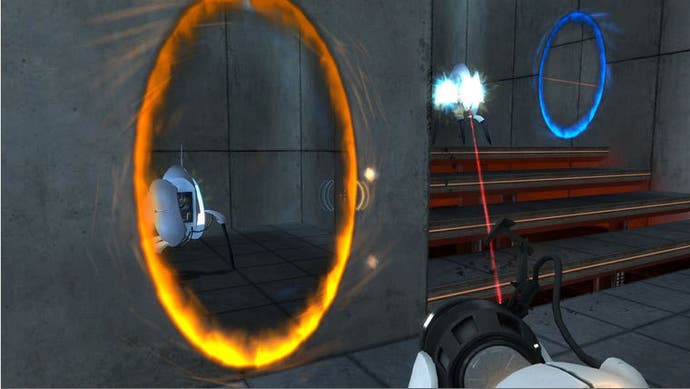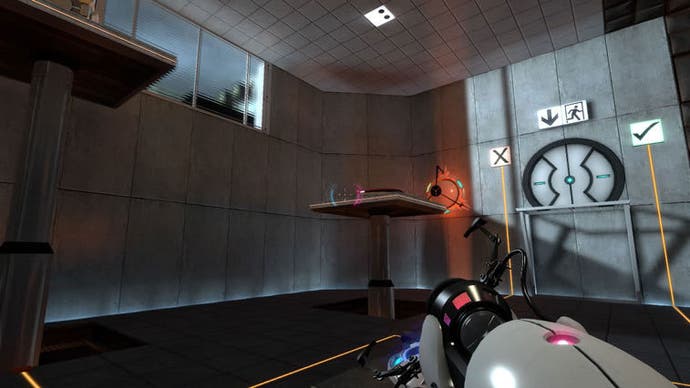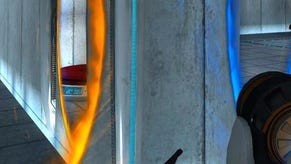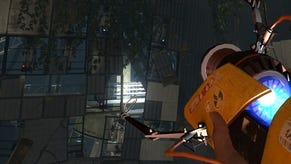Portal: Still Alive
Piece of cake.
Last week I reviewed BioShock. Today, I'm reviewing Portal. Tonight I'm gonna party like its 2007. It's foolish to complain though, since it's actually quite refreshing to see that the best games of twelve months ago are still a formidable commercial presence in an industry so often fixated on the next big sexy shiny thing rolling down the conveyor belt.
Portal, for anyone just emerging from a long stay in a dank Mexican prison, is a first-person puzzle game based on the Half-Life 2 game engine and featuring a story that takes place in the same world as Gordon Freeman's adventures, even if the crossover is limited to background details and vague allusion.
You're a test subject in the Aperture Science laboratory. There don't seem to be any other people, but you're guided through a series of test chambers by the mostly soothing tones of GLaDOS, the facility's AI computer. She introduces you to the concept of portal technology - the ability to create wormholes in space-time that allow you to walk through a solid surface and emerge somewhere else. Using this mind-bending concept, your task is to navigate each chamber and reach the elevator to the next section.
To begin with things are kept simple - using fixed portals at first, then later acquiring a portal gun that allows you to place one blue portal with a designated exit point. Later still you get the ability to place both entrance and exit portals, and the complexity of the puzzles increases exponentially. An understanding of physics is vital, as questions of mass, velocity and momentum play a pivotal role in cracking some of the later head-scratchers.

"Now you're thinking with portals," coos GLaDOS, when you seem to be grappling with the notion successfully, and it's definitely a learned skill. It's the sort of game where you'll swear blind that a particular problem is absolutely unsolvable, until you apply some lateral thinking to the potential of portals and it all becomes incredibly obvious. It's a highwire of frustration and reward that all the best puzzle games balance on, and Portal is as nimble as any of them at pulling it off.
But the puzzles are only part of Portal's genius, and it's arguably the story that elevates it to classic status. Subtle at first, it eases you into its world so carefully - like a fat man in a hot bath - that you almost don't realise that a darkly comic narrative is unfolding around you. Clues begin to accumulate that all is not well at Aperture Science, and the communications from GLaDOS begin to take on a worrying tone. It's all fabulously minimalist - dropping hints and nudges at just the right moments to open your eyes to where it's all leading. And where it's leading is one of the most wonderful conclusions to a videogame in recent memory, one that should erase any quibbles about the relatively short playing time for all but the fussiest gamer.
All of this is, of course, available in Valve's generous Orange Box compilation along with a trifecta of Half-Life 2 content and the giddy joys of Team Fortress 2. So what purpose does this Xbox Live Arcade release serve? Well, as covered in last week's preview, there's a bunch of additional puzzles available separately from the main menu. They'll add another couple of hours to the game - more if you favour speed runs - but they're not a particularly impressive selection.

The new puzzles feel torn between reintroducing concepts already established in the main game and coming up with a handful of new obstacles to think your way around. The sixth of the new puzzles is an absolute belter - a long sequence of interlinked tasks that really stretches your ability to think on your feet. Had the extra levels continued evolving in that direction, they'd be essential for all Portal fans. Sadly, after that they revert to surprisingly small and often simple problems - usually just requiring one small burst of mental energy to figure out. Having done so, I couldn't help but slump despondently every time turning the first corner after an initial puzzle revealed the elevator rather than more gameplay.
So Still Alive doesn't have a lot to offer the existing Portal fan, especially for 1200 Points, beyond new Achievements and the faintly disappointing new levels. You can also argue that the entirety of The Orange Box can now be found second-hand for about the same price. However, it doesn't feel right to mark this release down on the basis of what other people may or may not already have in their software collection, or for the after-effects of second-hand market. Clearly this release is aimed at people who have yet to play Portal, the fabled casual gamer who probably won't have been enticed by a compilation of first-person shooters. In that regard it's a shrewd move - Portal is absolutely in-keeping with a casual approach to gaming, provided you're not one of those prejudiced folk who assume that "casual" means "unthinking moron".
Portal remains an absolutely fantastic game, a wonderfully constructed vignette of puzzles and gallows humour that everybody should play. This solus download offers just that. If you've already sucked the original experience dry, you can skip this without worrying that you're missing out. If you've yet to make GLaDOS' acquaintance, however, you should waste no time in downloading this.




